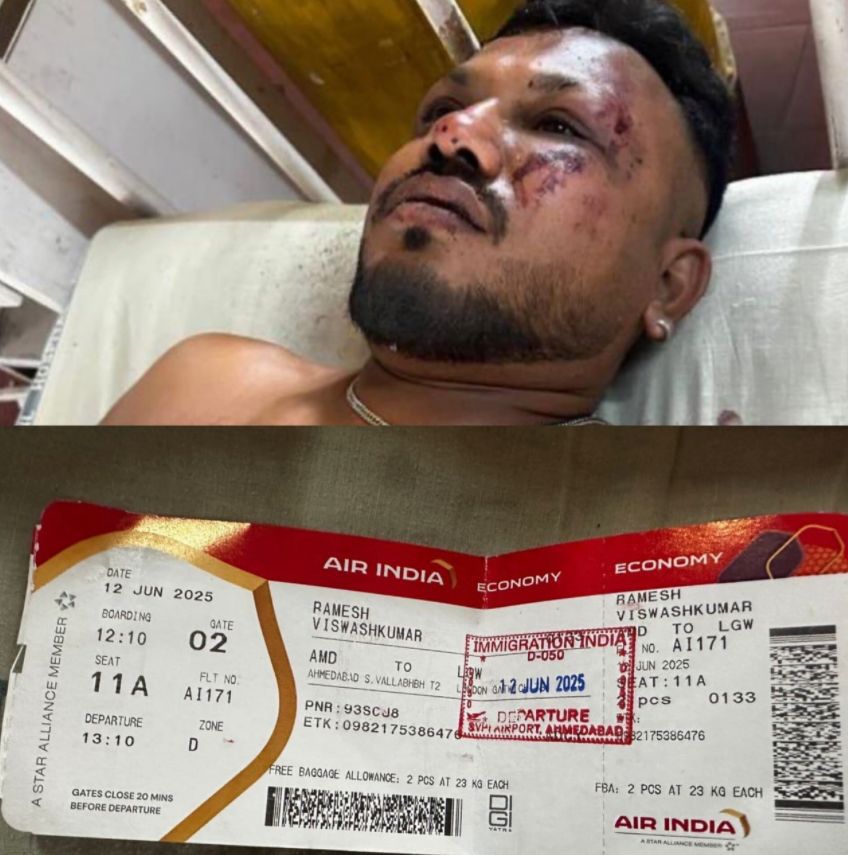
The Miracle Passenger: British National Ramesh Viswashkumar Identified as Sole Survivor in Air India Tragedy

In what many are calling a miracle amidst a national tragedy, British national Ramesh Viswashkumar has been confirmed as the only survivor of the devastating Air India crash that claimed the lives of 241 passengers and crew members. The aircraft, which was carrying a total of 242 people, went down in a fiery crash that has shocked the world and plunged hundreds of families into mourning. Authorities, aviation experts, and emergency personnel were left stunned when they discovered Viswashkumar alive among the charred wreckage and twisted metal—a flicker of life in a scene of utter devastation.
The ill-fated Air India flight had taken off from Indira Gandhi International Airport in Delhi en route to London Heathrow. Somewhere over Iranian airspace, the aircraft lost communication with air traffic control and suddenly vanished from radar. What followed were several hours of confusion, anxiety, and frantic efforts by aviation and rescue authorities to locate the plane. When it was eventually found in a remote mountainous area, it was clear that the aircraft had suffered catastrophic damage on impact. Wreckage was strewn over a wide area, with black smoke rising from the crash site long after the flames had been extinguished.
Amid the wreckage, search and rescue teams stumbled upon something no one expected—a faint voice calling for help. Emergency personnel rushed to the source and found a severely injured man clinging to life under a mangled seat frame. He was identified through his UK passport as Ramesh Viswashkumar, a 34-year-old software engineer from Birmingham. Miraculously, he was conscious, although in critical condition. Medics on the scene performed emergency triage before airlifting him to a hospital in Tehran, where he is now in stable condition after undergoing multiple surgeries.
News of Viswashkumar’s survival spread like wildfire, offering a sliver of hope to a world reeling from the tragedy. Social media platforms were flooded with messages of awe, disbelief, and support. His name quickly became a global trend, with hashtags like #MiracleRamesh and #AirIndiaSurvivor dominating timelines. In Birmingham, neighbours and friends gathered outside his family home, expressing both joy for his survival and sorrow for the other lives lost.
According to initial reports from investigators, Viswashkumar had been seated toward the rear of the aircraft, an area that is statistically more survivable in aviation accidents. Experts believe a combination of factors may have contributed to his survival, including his seat position, the angle of impact, and perhaps sheer luck. Authorities are now combing through flight data recorders, cockpit voice recordings, and satellite information to piece together what exactly caused the aircraft to crash so suddenly and violently.
Back in London, officials at the Indian High Commission have issued a statement expressing deep sorrow over the tragedy and extending full support to the bereaved families. British authorities have also pledged to provide any assistance necessary for Viswashkumar’s recovery and repatriation. "This is a moment of unimaginable grief but also of miraculous hope," said UK Foreign Secretary Elaine Cartwright in a press briefing. “Mr. Viswashkumar’s survival is nothing short of extraordinary. We are doing everything we can to support him and his family.”
Viswashkumar’s family has since spoken to local media, revealing that he was returning to the UK after spending time in India visiting relatives. His mother, sobbing uncontrollably, said she had prayed for his safety every day of his trip and fell to her knees upon hearing the news of the crash. “When I was told he survived… I couldn’t believe it,” she said. “God heard my cries.”
At the hospital, doctors say Viswashkumar has multiple fractures, internal injuries, and severe burns, but his prognosis is improving with each passing day. Though physically broken, he reportedly asked about the fate of the others on board as soon as he regained consciousness—a heartbreaking moment for hospital staff who had to gently inform him that he was the sole survivor.
Meanwhile, grief grips the families of the 241 victims who perished. Memorial services have begun springing up in cities around the world, from Delhi to Toronto, as families, friends, and strangers come together to honour the dead. Airlines across the globe have also initiated silent tributes, with moments of silence and lowered flags, acknowledging the loss and the fragility of life in the skies.
Aviation investigators from multiple countries, including India, the UK, and Iran, are collaborating on what is now a high-priority international probe. Early speculation ranges from mechanical failure to potential pilot error or even external interference, but officials have warned against jumping to conclusions until a thorough analysis has been completed. The black box has been recovered and is expected to provide crucial insights into the plane’s final moments.
As the world waits for answers, the name Ramesh Viswashkumar has taken on a symbolic meaning—one of survival, of the human will to live, and of a miraculous light amid an overwhelming darkness. Plans are already being discussed for a tribute at Heathrow Airport upon his eventual return, not just to honour him but to remember those who weren’t as fortunate.
Mental health experts have also been called in to support both Viswashkumar and the families of the deceased. Survivors of such catastrophic events often face a long and painful emotional recovery, including survivor’s guilt and PTSD. The UK National Health Service has already offered to provide Viswashkumar with ongoing psychological support when he is fit enough to return home.
For now, all eyes remain on a hospital room in Tehran, where one man’s heartbeat serves as a testament to resilience, randomness, and the inexplicable twists of fate. The world mourns, but it also watches in wonder as a man who should not be alive begins the long road to healing.


